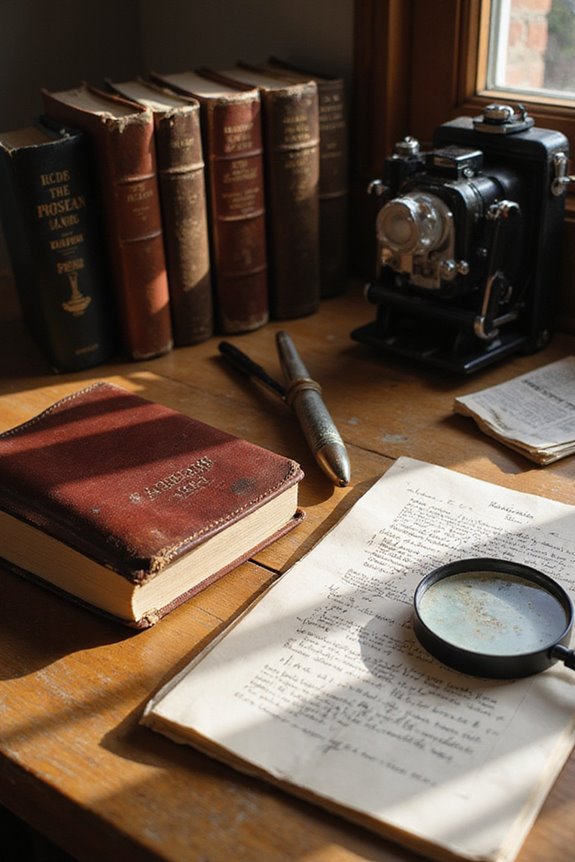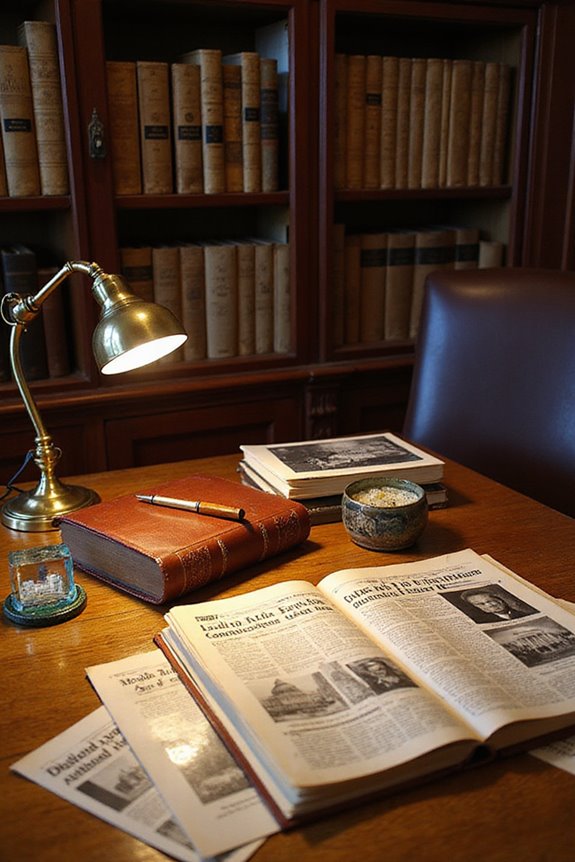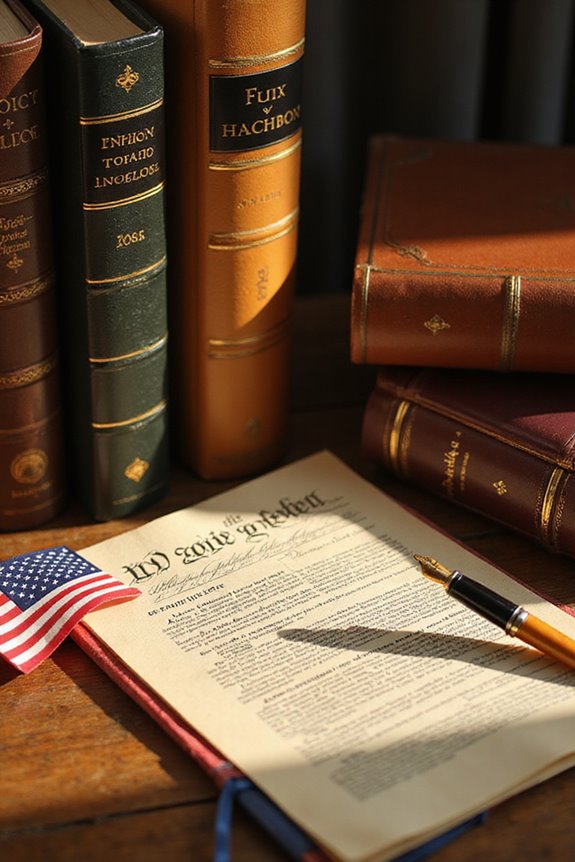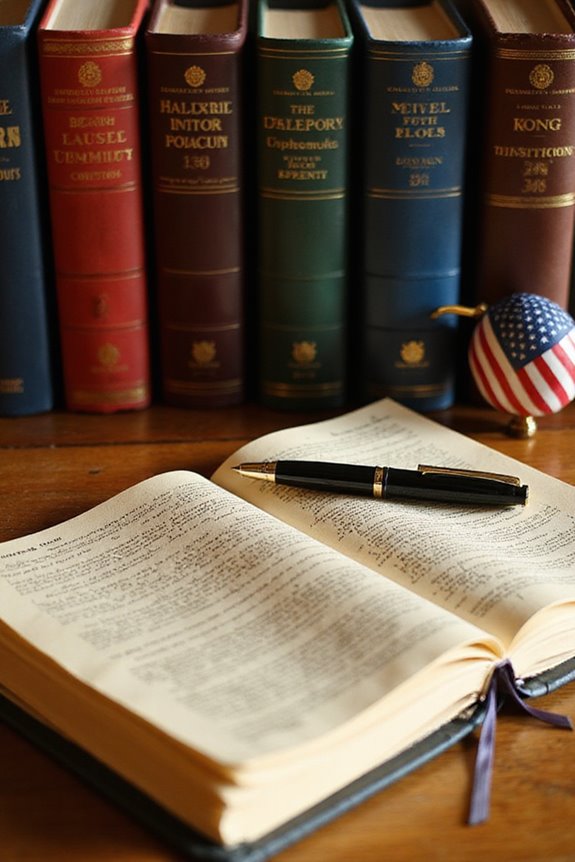If we’re seeking insightful books on political journalism, several stand out:
- *All the President’s Men* highlights investigative techniques.
- *Merchants of Truth* addresses challenges in modern journalism.
- *Whistlestop* offers stories from U.S. presidential campaigns in audio format.
- *Fragile Empire* explores political narratives in Russia.
These works cover significant themes like ethics and media bias, enhancing our understanding of political journalism’s role. As we explore further, we’ll uncover more valuable insights.
Key Takeaways
- *All the President’s Men* by Woodward and Bernstein showcases investigative techniques in political journalism through the Watergate scandal.
- *The Bully Pulpit* explores the relationship between journalism and political reform during Theodore Roosevelt’s presidency.
- *Merchants of Truth* critiques the impact of commercial pressures on fact-based journalism’s evolution.
- *Fragile Empire* examines the rise of Putin in Russia, highlighting political narratives in contemporary journalism.
- *The Collapse of the Third Republic* offers insights into WWII France through firsthand interviews, enriching political journalism’s historical context.
Key Academic Resources on Political Journalism
When we explore key academic resources on political journalism, we find several essential journals and fellowships that provide valuable insights and research.
- The American Political Science Review (APSR) and Perspectives on Politics are leading journals that shape academic frameworks in this field.
- PS: Political Science and Politics focuses on teaching methodologies, while the Journal of Political Science Education emphasizes pedagogical issues. Additionally, APSA, which serves over 13,000 members globally, plays a crucial role in advancing the study of political science, including journalism, particularly through its emphasis on political theory and institutions in understanding governance.
- APSA’s congressional fellowships offer journalists firsthand experience in legislative processes.
In addition, understanding survey research methodologies is vital. Ethical considerations are highlighted by organizations like AAPOR and WAPOR, which guide journalists in accurately interpreting polls. They stress the importance of transparency, ensuring the public receives reliable information about political opinions and actions.
Influential Political Journalism Books

Understanding the foundations of political journalism leads us to explore influential books that have shaped the field.
- *All the President’s Men* by Woodward and Bernstein exemplifies investigative techniques by detailing the Watergate scandal, illustrating journalism’s power to hold leaders accountable.
- *The Collapse of the Third Republic* provides insights into the political climate of WWII France through firsthand interviews, showcasing the depth of journalistic inquiry.
- *The Bully Pulpit* highlights the interplay between journalism and political reform during Theodore Roosevelt’s era, emphasizing media ethics.
- *Merchants of Truth* critiques the evolving nature of fact-based journalism amid commercial pressures, reflecting contemporary challenges. Additionally, *Fragile Empire* offers insights into Putin’s rise to power, shedding light on the complexities of political narratives and public perception in modern Russia.
These works collectively underscore the importance of ethical reporting and investigative integrity in maintaining democracy.
Political Journalism in Audiobook Format

How can we engage with political journalism in a way that is both informative and accessible? Audiobook formats offer a unique approach to political journalism, enhancing our audiobook engagement through compelling narrative techniques. Here are some notable examples:
- *Whistlestop* by John Dickerson provides behind-the-scenes stories from U.S. presidential campaigns, lasting 13 hours.
- Barack Obama’s A Promised Land offers insights into his presidency over an extensive 29-hour narrative.
- Jake Bernstein’s Secrecy World explores the Panama Papers scandal in just 10.5 hours, offering critical examinations of political dynamics related to international finance.
These audiobooks often feature authors narrating their works, which adds authenticity. Additionally, varying lengths cater to different listener preferences, allowing us to choose concise explorations or in-depth investigations. Audiobooks are a valuable resource for understanding political journalism today. Furthermore, they often emphasize the importance of voter education and participation, making them not just informative but also a call to action for listeners to engage actively in the political process.
Themes and Issues Explored in Political Journalism Literature

Themes and issues explored in political journalism literature reflect the complexities of reporting in a rapidly evolving media landscape.
- Ethics challenges are central, as journalists must balance objectivity with the pressures of media ownership and audience engagement. Journalists are increasingly required to navigate the complexities of democratic norms to uphold their ethical responsibilities.
- Media bias can undermine the credibility of news outlets, risking their roles as impartial informers of the public.
- The prevalence of misinformation complicates reporting, pushing journalists to verify facts amidst rapid news cycles. Additionally, the growth of digital media has transformed how news is consumed, making it essential for journalists to adapt their strategies.
- Coverage often skews towards the “horse-race” narrative, focusing on elections rather than substantive policy analysis, which can mislead the public.
- Investigative journalism remains essential in promoting accountability, yet it faces obstacles like legal pressures and resource limitations.
These themes reveal the intricate responsibilities of political journalists in maintaining democracy.
Historical and Institutional Perspectives

As we explore the historical and institutional perspectives of political journalism, it is crucial to recognize how these elements have shaped the field.
- Political journalism’s historical evolution began with support for American independence and grew through the First Amendment’s protection of press freedom. Colonial newspapers were pivotal in defining colonists’ grievances and supporting the American Revolution. This legacy of press freedom continues to influence contemporary journalism and its ability to hold power accountable.
- The penny press era expanded access to political information, while advocacy journalism emerged as newspapers gained influence in the late 19th century.
- Institutional influences were solidified during the Progressive Era, with investigative journalism exposing corruption and prompting reforms.
- However, media consolidation and digital disruption challenged traditional practices, affecting resource allocation for investigative work.
- Today, political journalism continues to adapt, reflecting both historical legacies and institutional pressures in its ongoing pursuit of transparency and accountability.
Impact and Methodologies in Political Journalism Research
In examining the impact and methodologies of political journalism research, we recognize the vital role that investigative techniques play in shaping public discourse. Key methodologies include:
- Document Analysis: Uncovering political corruption through careful examination of records.
- Source Development: Building trust with insiders to obtain credible information.
- Data Analysis: Utilizing digital tools to visualize complex political data for clarity. Political journalism acts as a bridge between politicians and the public, facilitating informed decision-making. The New York Times exemplifies how comprehensive coverage can inform the public on critical issues.
As we conduct impact assessments, we find that quantitative techniques like surveys and computational analyses are on the rise, encompassing over 20% of current research. Meanwhile, qualitative methods are gaining traction, focusing on meanings within political narratives. Together, these research methodologies enhance our understanding of political journalism’s influence on society and help hold officials accountable through evidence-based reporting.
Notable Case Studies in Political Journalism
Notable case studies in political journalism reveal how investigative reporting can considerably influence public perception and policy. These investigations often employ advanced investigative techniques to uncover political scandals that shape history.
- *Los fogones de la Kitchen* exposed corruption linked to illegal spying in Spain, leading to significant legal actions.
- Woodward and Bernstein’s Watergate reporting implicated the Nixon administration, showcasing the power of journalism in political accountability.
- Florence Graves’ investigation into Senator Packwood resulted in his resignation and the Congressional Accountability Act, emphasizing accountability in Congress.
- Dana Priest and William Arkin’s “Top Secret America” exposed the extensive post-9/11 intelligence community, affecting national security debates. Additionally, the reporting on the Panama Papers highlighted how wealthy individuals concealed assets through offshore tax havens, prompting global scrutiny and policy changes.
These cases underscore the crucial role of political journalism in promoting transparency and shaping public discourse.
Frequently Asked Questions
What Are the Key Challenges in Modern Political Journalism?
We’re facing key challenges in modern political journalism, including the need for effective fact-checking strategies and bias recognition. These issues hinder our ability to provide accurate information and maintain public trust in an increasingly polarized environment.
How Can Political Journalism Impact Public Opinion?
Oh, media’s our trusty puppet master! It shapes public perception, pulling strings with influence over opinions. We see how selective reporting and flashy headlines can turn us into political marionettes, dancing to the tune of agendas.
What Skills Are Essential for Political Journalists Today?
To thrive as political journalists today, we need strong investigative reporting and data analysis skills. These abilities help us uncover truths and present complex information clearly, fostering informed public discourse and trust in our work.
Are There Ethical Dilemmas Specific to Political Journalism?
Steering through political journalism’s ethical dilemmas feels like walking a tightrope. We often face conflicts of interest, balancing source credibility with the truth. It’s imperative we maintain integrity to foster trust and provide accurate reporting.
How Has Social Media Changed Political Journalism Practices?
Social media’s transformed political journalism practices, hasn’t it? While it amplifies engagement, it often compromises news accuracy, pushing sensationalism over substance. We must critically evaluate sources to navigate this complex landscape and uphold journalistic integrity.







